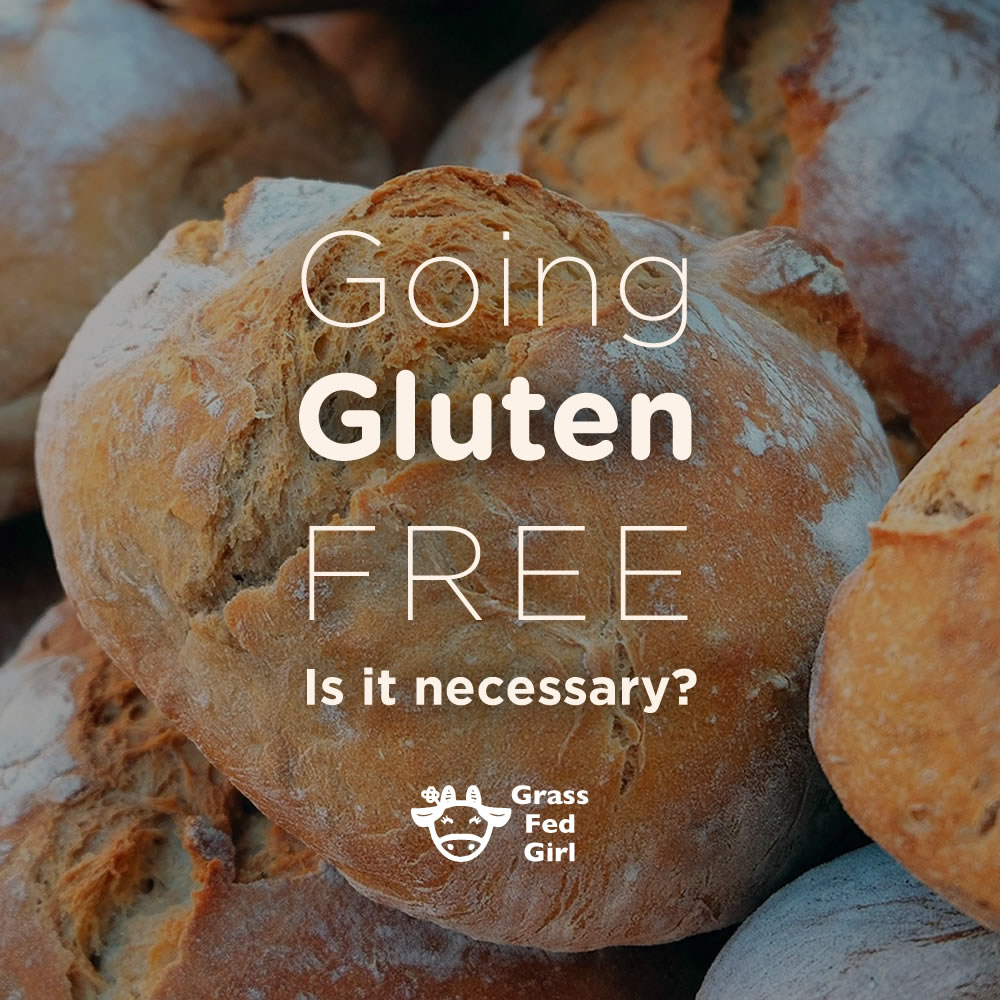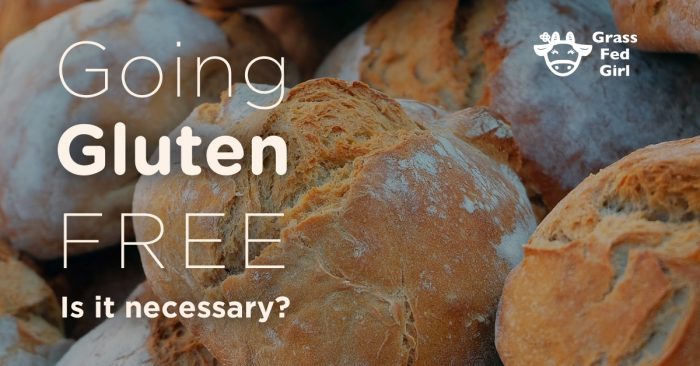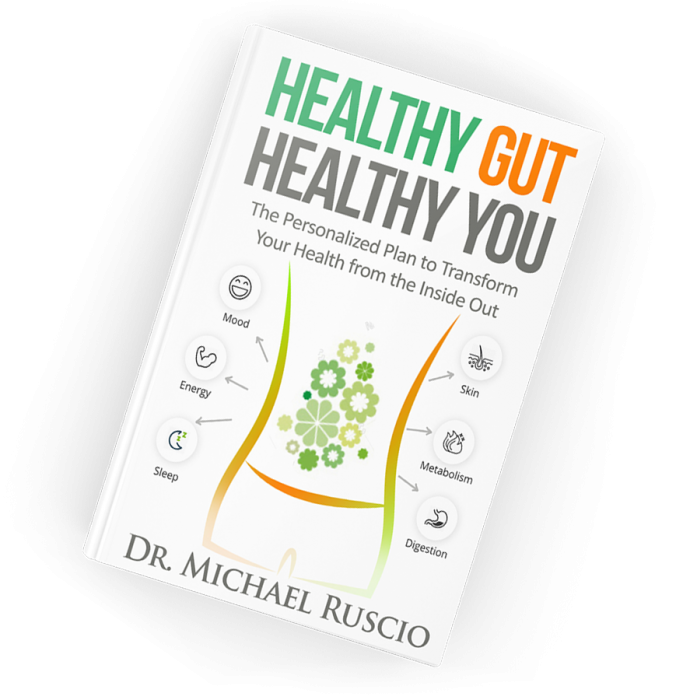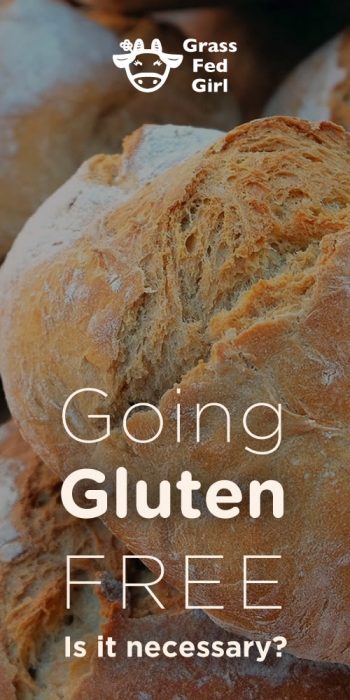
I’m about to say something very controversial, are you ready? You might not need to go gluten free.
Gasp!
I know what you’re thinking – but gluten is terrible for you!
But is gluten really terrible for everyone?
As a country, we’ve come to vilify gluten. Gluten has become what fat was for the past 50 years or so. We were absolutely, without a doubt convinced fat was horrible and recommendations were made to reduce fat intake to what turned out to be dangerously low levels.
What we’ve since come to find out, is fat wasn’t the culprit behind the boom in obesity, diabetes, and heart disease. No, it was the food system’s development of monster-like fats that had no business being in our bodies – “Frankenfats,” if you will. Many fats as they appear in nature are not only totally OK but essential to our overall health and well being.
My concern regarding gluten is that the science suggests not everyone needs to avoid it. Yet, we’ve made gluten out to be something that should be feared. When you condemn a food in a complete and nondiscriminatory way, it over simplifies the situation and creates unnecessary anxiety. On top of this, I worry it prevents people from looking into other very common gut related issues.

Knowing whether or not you have gluten sensitivity is important. Actually, this topic is of such importance, I spend an entire chapter outlining the details in my new book, Healthy Gut, Healthy You.



It’s worth taking the time to ask yourself: Who can eat gluten? And who can’t?
Who Can Eat Gluten?
Gluten is a mixture of proteins found in many grains. While a gluten-free diet can be helpful for many people, it is also an issue shrouded in fear and dogma. Knowing whether or not you should actually avoid gluten is a personal health factor I believe is worth getting right. When you over avoid gluten and it’s not necessary, you cause yourself unnecessary stress and fear.
Research has found that some people who appear sensitive to gluten are sometimes actually sensitive to FODMAPs, a collection of short chain carbohydrates. FODMAP stands for Fermentable, Oligosaccharides, Disaccharides, Monosaccharides, and Polyols (try saying that three times fast). These carbohydrates can cause an overgrowth of harmful bacteria and uncomfortable conditions of the gut such as small intestine bacterial overgrowth (SIBO).
In Chapter 7 of my new book, Healthy Gut, Healthy You, I discuss the specifics of testing, so you can get a proper diagnosis and live your life according to what your body actually needs, as opposed to living out of fear.
If you don’t have a sensitivity to gluten, you do not need to avoid it.
That being said, determining your relationship to gluten and other food allergens is one of the most important steps you can take towards improving your health. For anyone who has celiac disease or nonceliac gluten sensitivity, taking the steps to rid your body of this allergen is likely going to make you feel a lot better.
Who Shouldn’t Eat Gluten?
There’s no debate about avoiding gluten if you are sensitive to it. If you have issues with gluten and continue to eat it, you’re setting yourself up for serious health issues, including:
- Skin conditions
- Irritable bowel syndrome
- Digestive issues
- Brain fog
- Weight gain
- Depression
- Autoimmune conditions
Additionally, if you aren’t celiac but were diagnosed with an autoimmune condition – you should try a gluten free diet. Many people with autoimmune disease have found avoiding gluten helps their symptoms.
Finally, some may never receive a formal diagnosis but find they feel better when they avoid gluten. If you’re one of those people, that’s totally fine. I just hope it isn’t a decision based in fear.
What does science tell us? The science surrounding gluten tells us not everyone needs to avoid it. Also, we might not have a complete picture – just how we didn’t with fats. We know that there are many places in the world where gluten just isn’t a problem. Could our problem with gluten be due to food science creating another Frankenfood? Possibly.
The bottom line is everyone is different and you should consider all the possibilities.
Have You Considered Other Possibilities?
Again, we’ve so completely made gluten into the archvillain, all too often people forget or don’t know there are other common culprits they should be checking for:
- Small intestinal bacterial overgrowth (SIBO)
- Low stomach acid
- FODMAP sensitivity
- Other food sensitivities
- Digestive enzymes
When you find the actual underlying cause of your health issues, you can make a plan that works for you. You might find that you don’t need to avoid gluten, which would allow you to go through your life free of an unnecessary dietary restriction.
So, Should You Go Gluten Free?
If you’re wondering whether or not you should personally go gluten free, I recommend Chapter 7 of my new book, Healthy Gut, Healthy You. There’s even a self-help plan at the end of the book to guide you through an easy to follow, step-by-step process to improve your health. This guide:
- Identifies symptoms of underlying health issues – Are you experiencing fatigue, brain fog, insomnia, weight gain, food sensitivities, cravings, skin issues?
- Addresses common and major causes of illness – I’ll walk you through the eight step process I use to repair, rebalance, and restore the health of my patients. Every step offers an opportunity to personalize your process so you can find exactly what works for you.
- Minimizes unnecessary interventions – All too often doctors are quick to pile on mountains of protocols, testing, and lifestyle changes that aren’t necessary and sometimes very expensive. I’m all about finding what works for you personally and only making the changes that are absolutely necessary.
- Offers a mountain of resources – This book has answers. And when there’s something personal to you that requires a deeper dive into further literature, this book points you in the right direction. Because it is my mission for everyone to live a healthy and fulfilling life in a manner that is unique to their body.
Individualized healthcare is the future of medicine. It’s time to stop being a victim of dietary dogma and discover answers that work for you. Knowledge is power – isn’t it time you found the answers you’re looking for?
Grab a copy of Healthy Gut, Healthy You and start your journey towards your best health, without unnecessary limitations and the freedom from fear.




